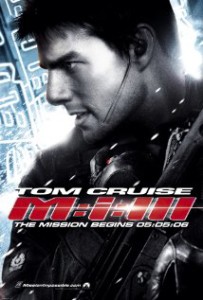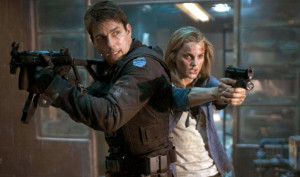 Ah, the three-quel, the film that either becomes the revitalization of a would-be franchise or the dagger plunged forcefully into the heart of it. The result of which, as is the case with most every film, is usually indicative of how much the filmmakers care about the story they are telling and the characters within. Mission Impossible III, henceforth referred to by its catchy call sign “MI:3,” came at a time when the franchise could have and arguably should have died. But when there’s something strange in your franchise neighborhood that is threatening to put an end to it, who you gonna call? JJ Abrams.
Ah, the three-quel, the film that either becomes the revitalization of a would-be franchise or the dagger plunged forcefully into the heart of it. The result of which, as is the case with most every film, is usually indicative of how much the filmmakers care about the story they are telling and the characters within. Mission Impossible III, henceforth referred to by its catchy call sign “MI:3,” came at a time when the franchise could have and arguably should have died. But when there’s something strange in your franchise neighborhood that is threatening to put an end to it, who you gonna call? JJ Abrams.
After the John Woo flashy, impersonal (read: John Woo-esque) take on Ethan Hunt in MI:2, JJ Abrams saw right to heart of the issue that could have ended the Impossible Mission films (IMF, see what I did there?) That issue was a question probably most of us inherently asked- who cares about Ethan Hunt? It was a character problem, and thus, inherently a story problem.
Ethan Hunt isn’t James Bond, even though he is somewhat modeled to be in the films, so we aren’t adherent to an icon. He isn’t a super hero like Iron Man or Captain America, so we aren’t attached to his ideals. And he never had a true hero’s journey for us to root for him as he ascended from unlikely hero to conqueror. He was at best the slick operative with the odds stacked against him (Mission Impossible) and at worst the kick butt action star who never runs out of bullets (MI:2). So this film’s take on the character came as a refreshing surprise.
 From the first moments of this film, we are with Ethan. As the gun is pointed at the love of his life’s head, the camera shaking with each count down warning, the blood trickling from their wounds, it feels real and dangerous. We’ve never rooted for this character as much as we do in those beginning few minutes. And throughout the film we see him care more than he ever had before. Not as an action star would with the obligatory “save the girl” heroism, but as a human being would who is desperately trying to save those he loves despite what it may cost him. He still plays hero, he’s a spy in an action film after all. But the humanity and the stakes are much more tangible.
From the first moments of this film, we are with Ethan. As the gun is pointed at the love of his life’s head, the camera shaking with each count down warning, the blood trickling from their wounds, it feels real and dangerous. We’ve never rooted for this character as much as we do in those beginning few minutes. And throughout the film we see him care more than he ever had before. Not as an action star would with the obligatory “save the girl” heroism, but as a human being would who is desperately trying to save those he loves despite what it may cost him. He still plays hero, he’s a spy in an action film after all. But the humanity and the stakes are much more tangible.
Ethan loses an operative he had once trained himself. In the first film, his entire team gets killed and his feelings amount to basically a heavy version of “that sucks.” In this film, this one operative’s death strikes him with serious grief, going so far as to affect his relationship. The film attacks this head on, deliberately trying to reverse the typical action tropes by examining loss and how it can affect even the sleekest of heroes. An ongoing conversation between Ethan and his other operatives about the viability of relationships for field agents almost seems like a meta conversation on the realism of action movie characters.
 All of this is of course wrapped in some of the best action movie sequences in the franchise. Abrams’ now signature shaky camera action style gives it a jolt of adrenaline and danger. The excitement of the action is what brings us to films like these, but we want something more. We need something to hold onto in our characters. We care about MI:3 Ethan Hunt because of his sacrifice, and we care about his sacrifice because we all have an inherent hope that there is a savior. We all live in this broken world. So, regardless of belief, there is a desire within every one of us for something greater. Our action heroes have a chance to show us a glimpse of that eternal hope. To show us that maybe what we think is impossible is possible.
All of this is of course wrapped in some of the best action movie sequences in the franchise. Abrams’ now signature shaky camera action style gives it a jolt of adrenaline and danger. The excitement of the action is what brings us to films like these, but we want something more. We need something to hold onto in our characters. We care about MI:3 Ethan Hunt because of his sacrifice, and we care about his sacrifice because we all have an inherent hope that there is a savior. We all live in this broken world. So, regardless of belief, there is a desire within every one of us for something greater. Our action heroes have a chance to show us a glimpse of that eternal hope. To show us that maybe what we think is impossible is possible.


1 comment